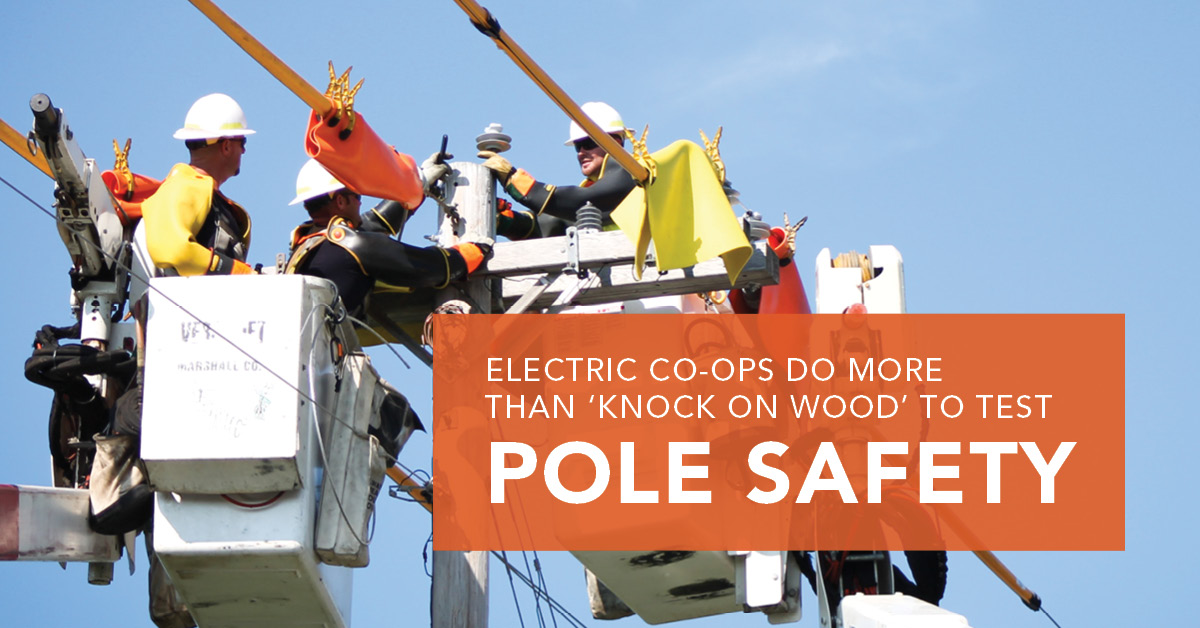
With the arrival of harvest time, Indiana’s farmers are shifting into high gear as they move into their fields to bring in their crops. The increased activity puts farmers and farm workers at greater risk, warns Jon Elkins, vice president of safety, training and compliance at Indiana Electric Cooperatives.
“Combines and grain augers are large pieces of equipment,” says Elkins. “People assume everything will fit under the power lines, but that isn’t always the case. The biggest cause of electrocutions on farms is equipment accidentally touching power lines.”
Here are some tips Indiana Electric Cooperatives recommends for farmers to protect themselves and their workers:
- Always look up and around before moving or raising equipment. Keep in mind power lines sag between poles, especially on hot days. A good rule of thumb is to stay at least 30 feet from all power lines and power poles.
- Never try to raise power lines to allow passage of tall equipment. Even non-metallic objects such as wood poles or branches can conduct electricity.
- Watch out for power poles, too. If you strike one, it may break, dropping a live line on your metal tractor or combine.
When considering the height of equipment, don’t forget about the radio antennas and GPS receivers that may reach another couple of feet above the roof.
Remember new equipment could be bigger and taller than what it replaced. Don’t assume the new equipment will fit in the same space.
When moving equipment near power lines, have a spotter on hand to ensure your safety.
If you’re not completely sure equipment will fit under a power line, find an alternate way to move it.
If you’re in equipment that touches power lines, stay in the cab and call for help. Tell others to stay away. In the rare case of a fire that requires you to escape, jump clear of the equipment. Keep both feet together and shuffle or hop at least 30 feet away.
“Working the land has enough hazards in the work itself,” says Elkins. “With care and planning, moving to and from the fields shouldn’t be one of them.”
Knowledge is power for farm safety
Anyone who operates farm equipment and augers should be educated about safe operating procedures and hazards, including the possibility of coming in contact with electric lines. Your electric cooperative reminds you to be alert when you’re at work.
- Remember: Lower grain augers to a horizontal position before moving from location to location. Pay attention to where power lines are located before raising an auger into position.
- Think safe, think 10 — the 10-foot rule, that is! When working with farm equipment or machinery, stay away from power lines at least 10 feet in every direction. If you need to work within 10 feet of an overhead power line, call your electric cooperative first.
National Farm Safety and Health Week
Fall harvest time can be one of the busiest and most dangerous seasons of the year for the agriculture industry.National Farm Safety and Health Week is Sept. 20-26, 2020. The week is meant to raise awareness of the importance of practicing and promoting safe work habits and conditions.
Data for the U.S. Bureau of Labor Statistics indicates the agricultural sector is still the most dangerous in America. In 2018, there were 574 fatalities, or an equivalent of 23.4 deaths per 100,000 workers. However, many injuries are preventable through education. Serious injuries and death can be prevented by cautiously approaching field adjustments or repairs, taking precautions to avoid slips and falls, making smart decisions while assigning tasks to youth, using and maintaining the slow-moving vehicle emblem correctly, and retrofitting tractors with rollover structures.
This annual promotion, the third week of September, initiated by the National Safety Council has been proclaimed as such by each U.S. president since Franklin D. Roosevelt in 1944. National Farm Safety and Health Week is led by the National Education Center for Agricultural Safety (NECAS), the agricultural partner of the National Safety Council.





